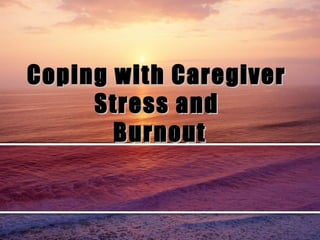
Caregiver burnout
- 1. Coping with CaregiverCoping with Caregiver Stress andStress and BurnoutBurnout
- 2. What is a Caregiver? Helping out in 1 or more ways: Personal care Helping around house Transportation/ shopping Orchestrating care Psychosocial support-visits, calls Financial/ legal affairs Living with you or you with them
- 3. We become caregivers through a variety of reasons such as: Choosing caregiving as a professional occupation Lifelong mate becomes disabled or chronically ill Care recipient needs short term support to recuperate from an illness loved one needs care at end of life
- 4. How did you get put in the caregiver role? Your choice Perceived obligation Attachment or relationship to that older adult Your ability to deal with the situation You perceived it as your responsibility Your spouse needs care A child born with a birth defect
- 5. What causes caregiver stress and burnout?
- 6. Caregiver stress can be caused by any of the following: Care receiver’s behavior and attitude Physical and emotional components of care Adjusting to work and caregiving Care receiver’s financial problems Adjustments of caregiving within the family
- 7. Causes of caregiver burnout may include: Demands from care receivers and others in the environment. Apparent helplessness of the care receiver’s condition. Unreasonable burdens put on yourself. Role confusion. Lack of control over money, resources, etc. Conflicting policies and procedures when trying to access support services.
- 8. How do you know when you are suffering from caregiver burnout?
- 9. Symptoms of caregiver burnout include: Withdrawing from friends, family, and other loved ones. Losing interest in activities previously enjoyed. Feeling blue, irritable, hopeless and helpless. Experiencing changes in appetite, weight, or both. Experiencing changes in sleep patterns. Getting sick more often. Feeling you want to hurt yourself or the person for whom you are caring. Becoming emotionally and physically exhausted. Being irritable.
- 10. Steps you can take to prevent caregiver burnout include: Find someone you trust, such as a friend, co-worker or neighbor, to talk to about your feelings and frustrations. Set realistic goals. Be realistic about your loved one’s disease. Don’t forget about yourself because you’re too busy caring for someone else. Talk to a professional.
- 11. Steps you can take to prevent caregiver burnout include, cont: Be honest with yourself about your capabilities and goals. Educate yourself. Develop new tools for coping. Stay healthy by eating right and by getting plenty of exercise and sleep. Accept your feelings. Join a caregiver support group. Contact your area Agency on Aging or local chapter of AARP for information on services available in you area
- 12. Steps you can take to prevent caregiver burnout include, cont: Take advantage of respite care services. Know your limits and take a reality check of your personal situation. Be honest with yourself about your capabilities and goals. Educate yourself. Develop new tools for coping. Join a caregiver support group.
- 13. Steps you can take to prevent caregiver burnout include, cont: Stay healthy by eating right and by getting plenty of exercise and sleep. Contact your area Agency on Aging or local chapter of AARP for information on services available in you area
- 14. Coping skills for caregivers include: Stress Management Exercise. Talk to someone about worries, concerns. Know your limits. Set limits. Make time for fun. Know what you have to do. Do one thing at the time. Know it’s O.K. to cry. Avoid self-medication. (Adapted Haigler, 1998)
- 15. Barriers to managing stress include: Trying to solve too many problems at once makes change overwhelming. Blaming others, “the system,” or “fate” prevents action. The buildup of stressors in our lives may affect our judgment and our initiative. Using drugs or alcohol as substitutes for resolving problems increases stress. A negative outlook makes us believe nothing can change. (Jolly, 1996)
- 16. Listening strategies to strengthen your communication with the older adult could include: Direct your full attention to the older adult when they speak. Provide encouragement for their opinions. Acknowledge and confirm their spoken words and body language. Use appropriate tone in your voice when you are speaking.
- 17. Listening strategies to strengthen your communication with the older adult could include: Assure older adults they have been heard. Decrease disturbing noises and activities within the environment.
- 18. Things the care receiver can do for the caregiver to relieve stress: Smiling is a real upper for the one who does the smiling as well as the one who receives it. Think before you complain and ask yourself, “Will this help?” Chances are your complaints only agitate the condition and anyone within earshot.
- 19. Things the care receiver can do for the caregiver to relieve stress: Look at your disease or disability head on, and do what is necessary to make your life and that of your caregiver as pleasant as possible. Never be demanding and remember no one is a slave to another person. Compassion and understanding go a long way.
- 20. Things the care receiver can do for the caregiver to relieve stress: Practice patience and moderation in all things. Demonstrate your love in every possible way. Let it radiate to all God’s creatures.
- 21. Things the care receiver can do for the caregiver to relieve stress: If you can possibly do it for yourself, do it, and be happy that you can. Express good manners… say thank you for the smallest things. Everyone wants and needs to be appreciated. Do your part to boost the entire family’s morale.
- 22. Things the care receiver can do for the caregiver to relieve stress: Your caregiver has a life other than caring for you, so rejoice when they have an opportunity to “go” without you. Laugh when things become tense. Many times that is all one can do. Be agreeable to change. Things cannot always be done like they once were.
- 23. Caregivers aren’t unpaid because they’re worthless… but because they are priceless.”